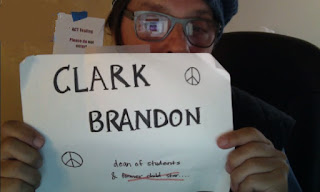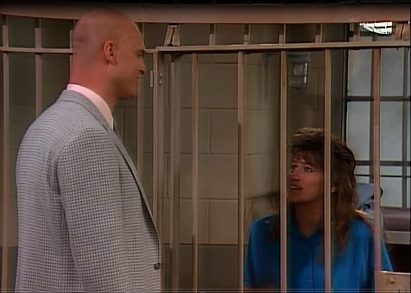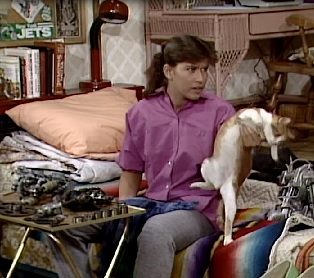
Good People: The Clark Brandon Interview (part 3)
Greetings, readers, and welcome to part three of my exclusive interview with Clark Brandon, 80s heartthrob and Facts’ own Eddie Brennan for four episodes. In part one, we learned about Clark’s history and initial thoughts about Facts, as well as about how sweating in a peacoat can be an acting breakthrough. In part two, we talked about who Eddie was, his character, and his outcomes. We also learned that there was very nearly a Jo and Eddie spinoff! I would have watched it. But whatever happened to Clark after Facts, and what is he doing now? To find out, continue on to Good People: The Clark Brandon Interview Part Three: I’m very respectful of people who reach out to me.
On Leaving Television
VO: Is there any 80s role that you can think of that you wish you’d had the opportunity to play?
I always thought Friends would have been a fun show, but I guess that was 90s. But that was right after I left, that show popped up. Actually, my kids went to school with a kid of one of the executive producers, and the son was in my house talking to his dad, and his dad said to me, “Where did you go? We were looking for you during Friends.” They read everyone for Friends, but I did think, “Oh shit. I should have left a year later.” Maybe I would have worked more. [Blogger’s note: He totally would have been Joey. And he would have been great.]

But I really loved the shows I worked for. TV was so different back then. The writing wasn’t the quality it is now. And when I was in it, there were only three networks. Fox came on right toward the end of it. So the competition was really rough. You only had three networks to compete for prime time shows, and three hours per day. So twenty-seven [sic] hours per network. Now, you can get a TV show on the cooking channel, or anywhere. It was a lot tougher back then to get a TV show. But most of them were like, B.J. and the Bear, or the KIT car, or Man from Atlantis. The classically horrible. But that’s what they had back then. When I was on Mr. Merlin, it was the last of the bad 80s shows. Square Pegs came in and took us over, and that just had a different vibe. It was a little more intelligent, it was written differently – a little more realistically as opposed to this weird world that they thought TV teenagers lived in. So it wasn’t really until I left TV that I said, “TV is getting a lot better.”
On Directing
I love directing. I should get a license place that says “13 Weeks” because my series never really lasted more than a season, but on my shows I always had a director’s clause for my second season. Again it was that part of me that would rather give than receive. I love directing because being an actor I was very comfortable with performance. A lot of directors come out of the technical side and not the acting side, and if they’re coming out of the acting side it’s very difficult for them to shoot fast, quick, and efficient. But I had the ability to shoot really quickly while also getting really good performances. So I loved directing. I started just as an independent filmmaker. My first film was what they called an erotic thriller [1992’s Dark Secrets]. We did it in six days up in the Mojave desert on a budget of sixty-five thousand dollars. It was great! I loved it! My most legitimate film, Skeeter, was shot in about four weeks and we had a pretty good budget for back then, about a million-six. Great actors. I really enjoyed that.

I enjoyed the camera. I still love the camera. I love the performances. My actors always felt like they were honored on my set because I came from their world. I always got everyone out by five o’clock, which was a huge thing.
VO: That’s amazing. That’s so human of you.
Well, it’s also the most important thing. No one wants to work eighteen hours a day. So I used to get out on time and also get plenty of coverage. It wasn’t like I was cheating or skipping shots. My secret was to rehearse a lot and then shoot. It just worked for me. I loved that career. And Skeeter was a New Line movie, and I got a chance to hire my own cast and hire my own crew. They just kind of gave me money, and said, “Come back with a film by this date,” which was very rare, especially for me, not being an established director at any level. And I kind of got spoiled by that, so when I bought an option – in fact, I just reprinted it up and I’m thinking about putting it out there – I optioned a French book, which was a French 70s movie, and I tried to do the exact same thing. I tried to say, “I want to cast it, and I want to shoot it, and I want to be left alone.” Every experience is completely different, and I was too myopic. People said, “No, it’s not going to be that way again. It was lucky that it turned out that way on Skeeter, but you’re probably not going to get all that freedom.” So I believed that, and that’s when I moved to New Hampshire, after two years of trying to raise money for that movie. So that taught me a lesson about how every film – every experience – is different. Just because you had all this wonderful latitude on that one film, the next film could be completely different. I should have accepted that. But I really enjoyed directing. I’d do that again. That’s for sure. Here [at school], we have a film class, and I film the kids all the time. So I’m enjoying myself without getting into the politics.
On Taking a Break from Hollywood – and Trying to Go Back
The politics of Hollywood is just suffocating.
VO: Would you like to elaborate on that?
Well, it’s very competitive, there’s a lot of money involved, and great perks. It’s a great country club, no doubt about it, and I think what happened to me was, I left the party. And when I came back after five years – I had just wanted to live in New Hampshire and do something different; I’d been an actor since I was in high school. But I came back; I woke up one day and said, “What am I doing in Portsmouth, New Hampshire?”
I came back, and it was just impossible for me to get back in. Every agent said, “I have too many clients already.” Everyone that I’d helped on my shows, and I went to their shows to help, said their hands were tied. And that’s maybe just my experience; maybe I just suck and no one really wanted me back!
But it’s just extremely competitive, because there’s so much money, and so much opportunity, and it’s a good life. I think it’s a very tough club to get in, and even if you’re in the club and you walk away for a little while – It was really difficult for me to go back. I probably could have persisted but at that point I was helping raise a family, and we decided to spend five years of me doing pick-ups and drop-offs and working with my lady while also working as a freelance designer. I helped her raise her kids, and she had enough financial independence that we didn’t have to worry about that. It really worked. She had three daughters. It was a handful! So I walked away [from Hollywood], and then I stumbled into this job at school.
On Working in Education
VO: How did you transition into education?
My step-kids were at a school where the headmaster here used to work. I was really an active parent, so I was at the school all the time. I did the school’s website; I did the school’s newspaper; I did the school’s academic journal. I was always over there, contributing whatever talents I had to the school, and I became close with [the headmaster].
So when he left that big school and started this school, with three kids, he put up a Google doc website. Then he called me up and said, “The kids are mocking me for this website at my new school. Can you do a website for us? And then the conversation evolved – remember, there were only three kids in the school – and I said, “Let’s make it a class. Let’s have the kids create their own website. I’ll teach them coding. I’ll teach them video. I’ll teach them photography. There are about six different disciplines in websites. So I spent one semester building the website with the kids.
Then I went on a freelance job back east, and [the headmaster] called me when I was back east and said, “We have eleven kids now, and we’re getting big enough that I need someone full time. The kids all thought you’d be cool.” It wasn’t academic, it was operations. I consider myself the concierge here. I run the place, I keep everyone happy. It was people skills.
In freelance, I was in a room alone all the time either designing or editing, and I thought, that’s not my skill set. My skill set is with people – my cast and crew – and a school is just like that! My cast is my students; my crew is my faculty; this is my set. I create the tone, the culture. So it’s really right up my alley. I love running things. I love creating spaces and keeping people happy, five steps ahead of where they think they are.
This has been really perfect for me. And it’s steady! As an actor and an artist my whole life, and living within an artists’ home my whole life – when I was fifty and I got this job, it was the first time in my life! My dad was on the soap operas, and soap operas were steady, but he hated them so he’d quit them all the time and then call them back when we went broke. So this is the first time I’ve really had a steady job. That really was unique, and something I love! So I can’t turn this one down.
VO: Do your students know about your past roles?
Well, first of all, this is on my door.

They’re pretty cool about it. We don’t promote it at any level, but they’re curious about it. And I’m healthy about it. I never ran away from it or anything like that. Occasionally I’ll find an embarrassing picture on the bulletin board.
This is a town where everyone is involved somewhat. I have more Hollywood connections now that I run the school than I ever did when I was a professional actor. It’s just part of a school that has a lot of different energies, and they’re not all “educating,” or dry. We’re a private, independent school, so we can have a lot of different people from a lot of different places. It just adds to the texture here.
VO: Have you had any moms who say, “Oh my God, you’re Eddie Brennan!”
Are you kidding? Yeah! Unfortunately. But it also helped with recruitment in the early days. Our first location was a house that someone’s dad bought. It was a dilapidated compound that he was going to tear down and build a new condo building on. But that was right in 2008 when everything crashed, so he said to Jim [the headmaster], “You can start your school in this place.” They already had a demo fence around it, and it looked dilapidated, so it was a litmus test that anyone would come up to our school and not just drive away when they pulled up. So any kind of legitimacy that we had would help. So in the beginning it helped when some parents would say, “Hey, I know you.” Jim and I both grew up in this neighborhood, so a lot of our families initially were people that knew me when we were teenagers. I have several families that I grew up with whose kids come here now.
On Looking Back
VO: Is there any advice that you would give to young Clark?
Slow down! Button your shirt! [laughter] Follow your passion. That’s what my father did. He said, “Follow your passion, and you’ll never have to worry about money.” Actually, not money, success. We were very non-material, so “success” is a better word. But yeah, if you love something that you do, you can’t help but be successful, because you’ll do it all the time; you’ll come in on Saturdays; you’ll work extra-hard. I loved my work back then. I enjoyed it. I had a lot of fun. It was a crazy time – you mentioned about the 80s. The 80s were a really crazy innocent time in a weird way. We could still be naughty, and it wasn’t weird. It was still innocent. This town was a lot smaller.
VO: And no one tweeted your every move.
Yeah. And no paparazzi. You could walk around. You could have a pretty normal life. But being in my twenties in the 80s and on TV didn’t suck. And I had good parents who kept me grounded all the time. And good friends. All those friends that I met when I moved here in fifth grade – 90% of my friends are all those people.
VO: If there is one TV episode, or movie, or anything you’ve ever done that could be dropped into a time capsule and preserved for all of human history, do you have any sense of what you would choose?
Oh hell no. I have the most mediocre career ever! There’s nothing really significant. The 80s was a different time. It was fun. I loved Mr. Merlin. That was a lot of fun. There was always a tiger, or a bear, or an elephant. We were in San Francisco and I went skateboarding down Lombard Street. That show was a lot of fun to do. But most of the stuff I did was pretty mediocre. Not to fault anyone. That was just the way the medium was at the time. I did a lot of after-school specials; do you remember those?
VO: Oh yeah.
Those were way lame! What probably drove me out of acting is that I played the same character for about twenty years. The same age, same character. The good-looking guy who was pretty much a schmuck, and always had a letterman’s jacket on. Pretty one-dimensional. But it worked. [Blogger’s note: Like I said, he would totally have been Joey.]
VO: I am familiar with Auggie Hamilton [of 1989’s Fast Food, a character who fit the schmuck with a letterman’s jacket description to a T.]!
Auggie Hamilton was fun too! I forgot all about that. That was a movie that did come to me. I did another movie called Funland with them – Atlanta Film Group – and I was always saying I wanted to direct. They were a little company. They said, “We have a script called “Fast Food,” and we have Jim Varney attached to it.” Jim Varney was Ernest at the time, and he was making a hundred million dollars a picture.

They said, “We have Jim Varney attached, but we need a script written by January, because he’s locking in his yearly schedule.” So they hired us to write it and to be in it. Of course, no one in the world liked Jim Varney unless he was Ernest. We went to the opening of Fast Food here in California and there was no one in the theater. That movie just disappeared. But again, it was fun, because we wrote it, and I got to act in it. Lanny, my co-writer, he was also in it. I knew Tracy Griffith well, so that was fun. And a producer on that movie split, and he gave me Skeeter, and wanted me to write that film. I said the only way I would write it is if I got to direct it. He said, “What do I care, it’s a bug movie!” And I said, “OK. That means we’re in.” He did want me to act in it. There was a cop I could have played. The lead. But I said, “No, I don’t want to act in it, I just want to direct it.” So he let me direct it. Fast Food actually led to my directing career, so I’m not going to knock it.
VO: Any last thoughts on Facts?
It’s an important part of pop culture, and our youth or whenever it was we were watching it. Like your first e-mail? I find that stuff endearing. I’m very respectful of people who reach out to me. I try to be, anyway.
And he was. In my experience, Clark Brandon is a pleasant, kind, accommodating, gracious guy. He’s good people. I can’t thank him enough for humoring me in this little caper and allowing me to learn more about my sacred show and my favorite decade. Thanks Clark, and happy Halloween! Come back tomorrow for a recap of part one of season eight’s “Seven Little Indians,” the Twilight Zone parody.





15 Comments
Paula Whisenant
I always wondered what happened to Clark Brandon. Thanks for this article! What a great walk down memory lane…and a reminder of one of my first heart throbs. 😉
Just Vikki
Thank you for reading! I'm so glad you enjoyed!
Unknown
Just saw him on love boat, great TV from the innocent days which I miss. Thanks for article
TheUnknownComic
Wow that was very cool. My sister loved Clark Brandon when we were young. Great interview. Thanks for it.
Unknown
I just found that Facts was on a channel I get so of course I'm recording them. I just saw one of the Eddie episodes and the Bates boy was Shawn Stevens… be still my heart!!!
KC
Just happened upon FOL on TV and looked up the cast and came upon your interview with Clark. Thanks so much! I was a huge fan! 😃
KC
Just happened upon FOL on TV and looked up the cast and came upon your interview with Clark. Thanks so much! I was a huge fan! 😃
Just Vikki
Thank you all so much! I'm so glad you enjoyed the interview and the blog. Please keep reading!
Unknown
Always wondered what happened to this guy. He's one of those actors who should have had a bigger career, but he's right, the writing back then was pretty lame. (I still watched every episode of Merlin.) Great to get an update and love hearing that he's in education. Sounds like a cool dude.
Unknown
Loved this article also…often wondered what happened to my favourite 80's heart throb❤
keely deloache
just curious, and i know i'm a year late, but how did u manage to track him down?
RogerClyne IsAGod
I was just watching an episode of Love Boat with Clark & thought I'd google to see where he is now & found this site!
Glad to hear he's alive & well & happy!
Unknown
Great interview! I'm curious to know if Clark and Nancy McKeon stayed in touch. Any idea???
Sandra Valencia
Wow.. I always wondered what ever happened to Clark. My mom use to work for him & his family.
MerrlD
Thank you and Clark so much for the interview. I always wondered what happened to him. Yes Clark was my teen crush back in the day. He came to the "World of Wheels" custom car shows as a celebrity guest and I attended everyone of them…somewhere, I believe, I still have those signed "head shots" form the car shows….ahhhh…the days of innocence and memories!
Thank you Clark,
I wish you the best!